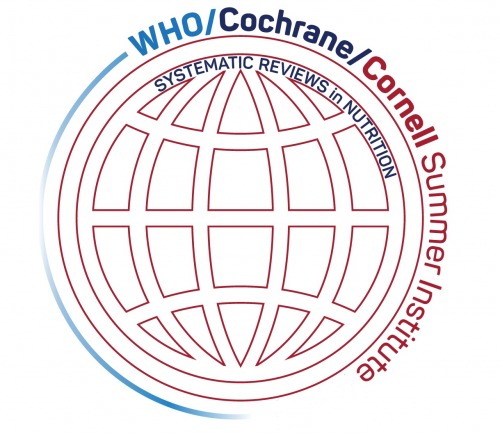Schedule

WHO/Cochrane/Cornell University Joan Klein Jacobs Center for Precision Nutrition and Health Summer Institute for Systematic Reviews in Nutrition for Global Policy Making
Schedule
In 2025, the Institute will combine online training (work at your own pace) with in-person sessions at the Cornell University campus. The formal program for the Institute is two weeks in length, requiring consecutive days of availability during the week of May 19th 2025 for asynchronous online instruction and the week of June 15th for synchronous meetings and work sessions on the Cornell University Ithaca, NY Campus. Participants are advised to plan to arrive in Ithaca on June 14, 2025 to attend an opening social event during the day on June 15th, and participants are advised to depart Ithaca on June 20th in the afternoon or on June 21st.
Prior to the Institute
Dates: early May, 2025
Modality: On-line asynchronous, work on your own, set your own schedule.
Prior to our first week, all participants work receive the introductory materials, get up to speed on Microsoft Teams, gain access to Cochrane modules, and get to know their systematic review team and review topic. This preparation is the lead in to a productive asynchronous first week of formal training.
Dates: May 19-25, 2025
Modality: Online asynchronous study
In week 1, all participants will work independently to complete the Cochrane Interactive Learning Modules asynchronously. Teams will be encouraged to meet periodically with the team mentor to support the participants in learning the material presented in the Cochrane modules, and several synchronous sessions will be provided to introduce Cochrane, nutrition activities in Cochrane, the WHO, and to support and encourage all participants to work through the online materials.
Time required: Each of the eight modules will require 45-120 minutes.
Topics covered by the Cochrane Interactive Learning Modules during the Summer Institute:
- Introduction to conducting systematic reviews
- Writing the review protocol
- Searching for studies
- Selecting studies and collecting data
- Introduction to Risk of Bias
- Analyzing the data
- Interpreting the findings
- Reporting the review
Dates: June 15-20, 2025 (arrive June 14, 2025)
Modality: In-person
This week, the Institute is held in person at Cornell University, Ithaca, NY. All participants will participate in hands-on activities, plenaries, discussions, and group presentations. Please see below a sample schedule showing the structure of the day.
The suggested arrival day for participants is Saturday, June 14, 2025
Sunday, June 15, 2025:
- Welcome activity and tour of local region: 10:00 am – 4:00 pm
Monday, 16 June – Friday, 20 June, 2025:
- Daily introduction session: 8:30 am
- Session 1
- Coffee break: 10:15 am
- Session 2
- Review Group meet-up
- Lunch break: 12:00
- Session 3
- Session 4
- Coffee break: 3:00 pm
- Review group meetup
- Round-up and discussion: 4:15 pm
Welcome Reception: Monday, June 15, 2025
Institute Dinner: Thursday, June 19, 2025
Friday, June 20 is the final day of the Summer Institute and either Friday afternoon or Saturday (June 21) are the suggested departure days.
Sessions include a combination of plenary talks, active learning workshops, work with teams on reviews to apply concepts, interactive training sessions with hands-on examples, case studies, etc. Our goal is to engage participants in an exciting and dynamic learning environment that is inclusive and supportive of all participants and that leads to open discussions and exchanges to achieve the learning outcomes of the Institute.
 |
WHO Cochrane Cornell Summer Institute, Contact InformationPatricia A. Cassano, PhD, Director, Summer Institute |
Please visit our registration page for details on how to apply.